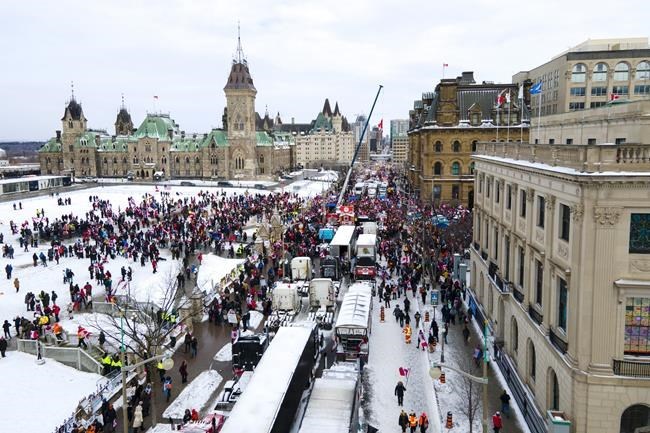OTTAWA — A transparency group says it has received information on donors to antigovernment protests after a major fundraising platform was reportedly hacked, and an analysis of the data suggests Canadians contributed the largest amount of money to the cause.
Distributed Denial of Secrets, which has a history of obtaining leaked information from right-wing organizations and providing it to media, says it has received over 30 megabytes of donor information from Christian crowdfunding site GiveSendGo.
The group provided a data set to The Canadian Press and it suggests significant Canadian involvement on top of much-publicized money flowing from the United States.
More than 36,000 donations, or 39 per cent, came from Canada, while 56 per cent came from the United States. Two per cent came from the United Kingdom and the remaining three per cent came from more than 100 other countries.
There were more than 92,000 listed donations in total.
The data shows that Canadians donated the largest amount of money at US$4.31 million. American donors sent US$3.62 million and British donors gave US$77,000.
The Canadian Press also analyzed donations by the first three digits of Canadian postal codes, known as forward sortation areas (FSAs), which showed that Kelowna, B.C., Carleton Place, Ont., northwestern Alberta, Calgary, and Kitchener, Ont. had the highest donation counts.
The data set shows names, email addresses, zip codes and internet protocol addresses.
On Sunday night, a Daily Dot reporter said on Twitter that GiveSendGo was redirecting to another site. On that site, a video from the Disney film "Frozen" played with a manifesto that condemned the fundraising site for its role in financing the convoy.
On Monday, visitors to GiveSendGo's website were shown a message that said the site was off-line for maintenance and server upgrades, and asked users to check back later.
GiveSendGo did not immediately respond to requests for comment Monday that were sent by email, Twitter and LinkedIn. The Canadian Press has not independently verified the hack or the leak.
One donor listed on the data set confirmed that he donated to the campaign.
Brad Howland was listed as the third-highest donor, giving US$75,000. He said in a written statement Monday that he supports the convoy. Howland is president of Easy-Kleen Pressure Systems in Sussex Corner, N.B.
"We are thankful to be blessed enough to support their efforts to do what they have to do in a peaceful way until the government removes the mandates to restore all our freedom as pre-COVID," he said of the protesters.
Another listed major donor was Holden Rhodes, a businessman and lawyer living in London, Ont. He confirmed that he did donate US$20,000.
"I am not prepared to accept a country without freedom for my family, my children, my friends, my neighbours and every other Canadian. That is why I am doing what I am doing," Rhodes said in an email Monday.
The convoy has been described as a protest against COVID-19 vaccine mandates for cross-border truckers, but key organizers had been pushing for an end to all pandemic-related restrictions before the federal government announced those rules.
The demonstrations are now shown to be part of a catch-all movement opposed to all public health restrictions and some participants, including organizers, have called for the overthrow of democratically elected governments.
On Monday, Finance Minister Chrystia Freeland announced the federal government is broadening the scope of anti-money laundering rules to cover crowdfunding sites.
They will now need to report to the Financial Transactions and Reports Analysis Centre of Canada (Fintrac), which she said will allow more information to be made available to police and other enforcement agencies.
Last week, the Ontario government successfully petitioned a court to freeze access to millions of dollars donated through GiveSendGo to the convoy protesting COVID-19 restrictions in Ottawa and at several border crossings.
The province obtained an order from the province's Superior Court of Justice that prohibits anyone from distributing donations made through the website's "Freedom Convoy 2022" and "Adopt-a-Trucker" campaign pages.
GiveSendGo said on Twitter on Saturday that "the funds from the Freedom Convoy are not frozen" and that the site is working with different campaign organizers to find the most effective legal ways to continue moving funds.
Earlier Monday, members of Parliament on the foreign affairs committee voted down a proposal from the NDP to invite U.S. Ambassador David Cohen to testify about American donations flowing to the protesters in the convoy.
New Democrat Heather McPherson argued the committee was the place to probe concerns about foreign interference in the protest movement, which she labelled a national emergency that has dragged on due to a lack of leadership.
Liberal Rob Oliphant, who serves as parliamentary secretary to Foreign Affairs Minister Mélanie Joly, said it made little sense to summon Cohen since the question of funding wasn’t a state-to-state issue.
Conservatives on the committee agreed and joined the Liberals in a 9-2 vote against calling Cohen.
This report by The Canadian Press was first published Feb. 14, 2022.
— With files from Jordan Press
---
This story was produced with the financial assistance of the Facebook and Canadian Press News Fellowship.
Erika Ibrahim, The Canadian Press



